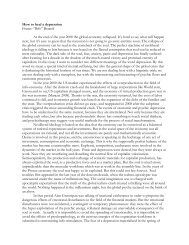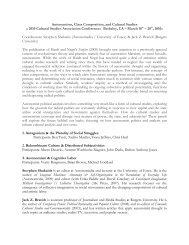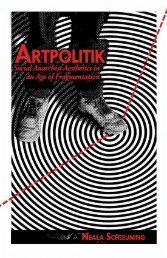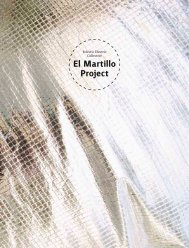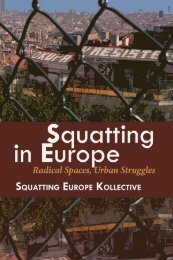nanopolitics handbook - Minor Compositions
nanopolitics handbook - Minor Compositions
nanopolitics handbook - Minor Compositions
Create successful ePaper yourself
Turn your PDF publications into a flip-book with our unique Google optimized e-Paper software.
very minor, communist movements. They gives us, temporarily and situationally,some experience in the practices and pedagogics of deproletarianisation. 51We find other such ‘communist movements’ in aspects of the landlessmovements of Latin America and elsewhere, where dispossessed peasantsand dejected urban dwellers come together to occupy and squat privatizedlands. 52 They do so on the background of their shared proletarian conditionand their desire to abolish it. The proletarian politics of un/occupation isone that affirms a common struggle, a condition shared differentially, overa common identity. The goal or desire of this struggle is not just a solutionto a problem shared by a set of individuals, but the common solution of acommon problem. The solution, in so far as the problem is the proletariancondition, is a movement of re-appropriation of the means of reproductionand production, and the creation of the relations of care and self-organisationwhich makes re-appropriation more than just a taking of things and land,but a mode of common (re)production and a development of our ability todo, make and live. We also find more partial struggles of deproletarianisationthat will give us greater reproductive autonomy and capacity for antagonism,for instance those that demand a guaranteed income, to decouple our livesand reproduction from the discipline of the wage. 53 From creating our ownpopular heath centres to taking over the hospitals, from starting our own cooperativeproduction to taking over and reshaping industries and agriculture:deproletarianisation is a complex and rich process. Our proletarian conditionis the ground for fear and dependency, the search for security and wages, andfor ‘social bodies and heads’ of capital and state. However, the abolition of ourproletarian condition does not abolish our interdependency on others and theearth for our reproduction. Here questions of commons and the earth, of ecologiesand care come up, as necessary aspects of any communist movement.Mostly struggles only become perceptible to outsiders when they cometogether under common slogans and names. However, they do not start there,but from our bodies – from our changing singular and collective bodies irreducibleto the modes of their individualisation. These are embodied formsof resistance and of struggle, organising themselves and aiming at their ownsustainability and multiplication. The sensitivities and relations developed innanopolitical practices open a way to practice our self-reproduction not asthat of enclosed organisms, individuals, but collective processes of becomingas part of multiple ecologies. This allows us to tune in to the micro-powersat work between and within us, the broad social antagonisms defining ourtimes, and to what we are and can become. Nanopolitics is one way to strivefor deproletarianisation, enhancing and enhanced by our other struggles toabolish the proletarian condition.216




